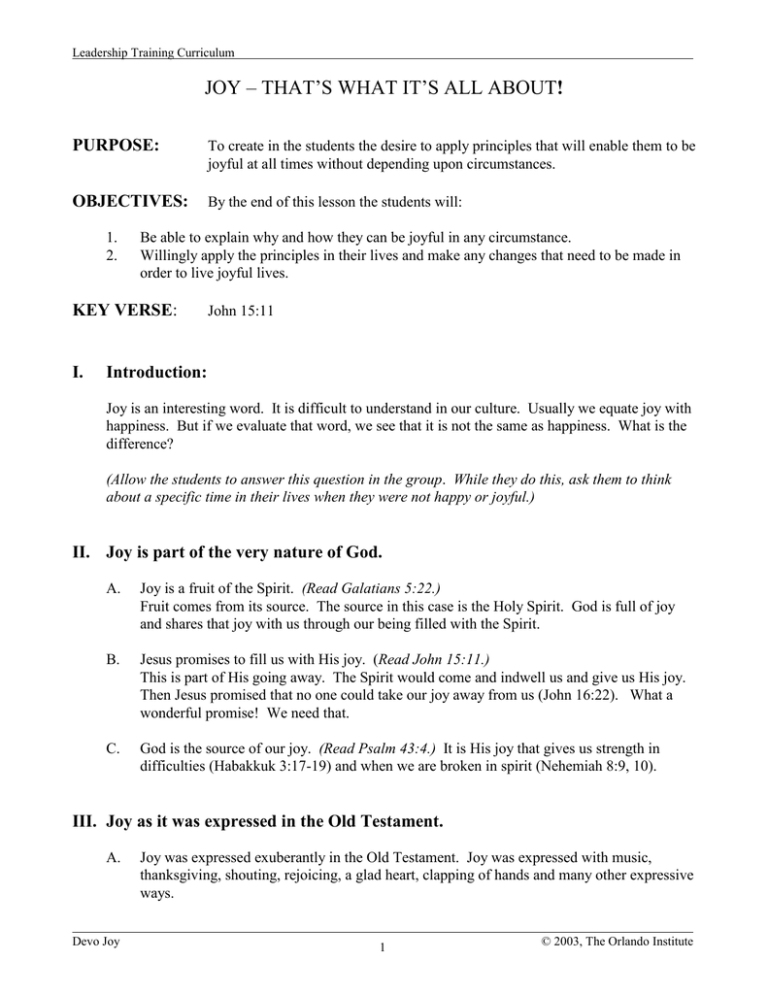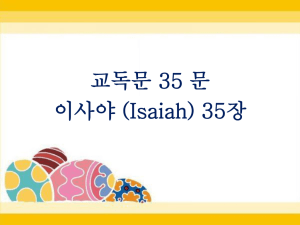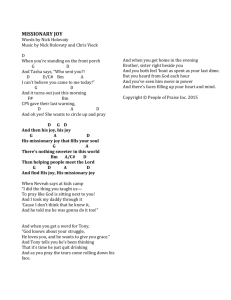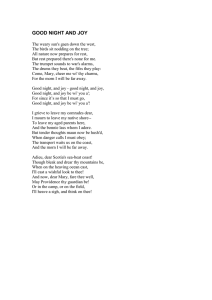PURPOSE:
advertisement

Leadership Training Curriculum JOY – THAT’S WHAT IT’S ALL ABOUT! PURPOSE: To create in the students the desire to apply principles that will enable them to be joyful at all times without depending upon circumstances. OBJECTIVES: By the end of this lesson the students will: 1. 2. Be able to explain why and how they can be joyful in any circumstance. Willingly apply the principles in their lives and make any changes that need to be made in order to live joyful lives. KEY VERSE: I. John 15:11 Introduction: Joy is an interesting word. It is difficult to understand in our culture. Usually we equate joy with happiness. But if we evaluate that word, we see that it is not the same as happiness. What is the difference? (Allow the students to answer this question in the group. While they do this, ask them to think about a specific time in their lives when they were not happy or joyful.) II. Joy is part of the very nature of God. A. Joy is a fruit of the Spirit. (Read Galatians 5:22.) Fruit comes from its source. The source in this case is the Holy Spirit. God is full of joy and shares that joy with us through our being filled with the Spirit. B. Jesus promises to fill us with His joy. (Read John 15:11.) This is part of His going away. The Spirit would come and indwell us and give us His joy. Then Jesus promised that no one could take our joy away from us (John 16:22). What a wonderful promise! We need that. C. God is the source of our joy. (Read Psalm 43:4.) It is His joy that gives us strength in difficulties (Habakkuk 3:17-19) and when we are broken in spirit (Nehemiah 8:9, 10). III. Joy as it was expressed in the Old Testament. A. Devo Joy Joy was expressed exuberantly in the Old Testament. Joy was expressed with music, thanksgiving, shouting, rejoicing, a glad heart, clapping of hands and many other expressive ways. 1 © 2003, The Orlando Institute Leadership Training Curriculum (Some verses that show how they expressed joy in the Old Testament are the following: Genesis 31:27; 1 Samuel 18:6-7; 1 Kings 1:40; Psalm 35:27; Psalm 132:9. In these passages are found various expressions of joy. You can ask students to read some of these passages.) B. We can be joyful at any time and in any place. Psalm 149:5 even states that we can sing for joy as we lie on our beds. C. Joy is impeded in our lives because of sin. Psalm 51 is the confession of David after his sin with Bathsheba. In verse twelve David asks the Lord to restore the joy of His salvation. He understood that joy came from the Lord and that sin had blocked that joy from entering his life. IV. Joy and relationships. A. Unity brings Paul joy (Philippians 2:2). What are we doing to create unity among the brethren? B. Christians are Paul’s joy (Philippians 4:1, 1 Thessalonians 2:20). Are we filled with joy because of what God is doing in other’s lives? Are we having a ministry in other’s lives that causes us to have joy? C. Troubles, when viewed correctly, can be a source of joy according to James 1:2-4. As incredible as it may seem, James tells the believers to see every situation, good or bad, as an opportunity for joy. From prison, Paul repeatedly exhorts believers to “…rejoice in the Lord always.” (Philippians 3:1; 4:4) Through problems, our dependence upon Him grows. With that growth in faith, our close relationship with Him grows. A secret to having joy at all times comes from giving thanks to God in all situations. V. Personal Application. A. Are you looking to the Source for your joy? God is ready to fill us with His joy. We need to seek Him and the joy that He gives. If you have a problem being joyful, then check to see where you are centering your life. B. Music can be used by God to draw out joy. It can also be used to detract us from knowing and loving Him. What kind of music do you listen to? C. How are you responding to difficult situations? Are you obeying James’ command to “count it all joy” when you encounter various trials? If you’re not, then why aren’t you? Let’s get back to looking to God to fill us with His joy in all situations. (Perhaps close in prayer) Devo Joy 2 © 2003, The Orlando Institute



